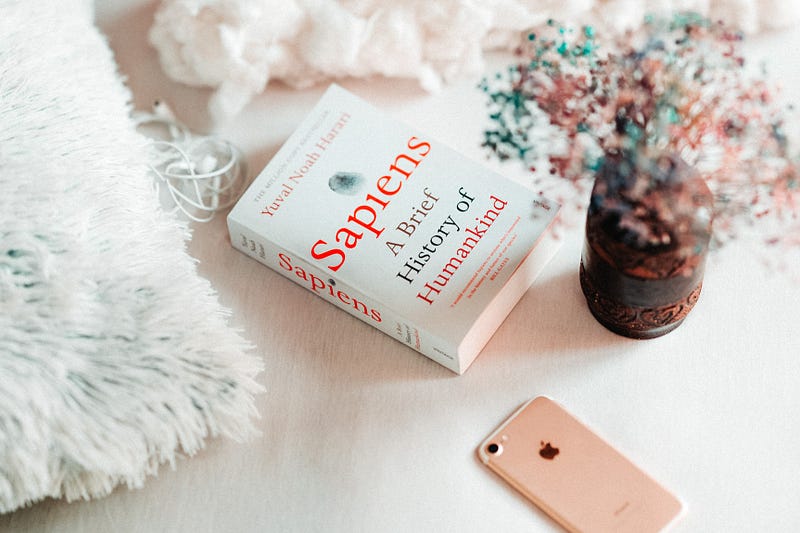On happiness, human extinction, and illusions.

To be honest, I fell asleep every time I read a few pages of Sapiens. I was overwhelmed by the width of Harari’s thoughts.
There’s a reason why he’s one of the most influential thinkers of our time. He regularly discusses global issues with heads of state, like Angela Merkel or Mauricio Macri.
In his recent interview on The Tim Ferriss Show, Yuval shared three thoughts I can’t stop thinking about. Chances are, they’ll change the way you think and go through life as well.
“We’re thousands of times more powerful than people in the stone age. But it’s not clear whether we are at all happier than they were.”
I’m an innovation enthusiast, and it took me some years and Tristan Harris to realize innovation doesn’t equal progress.
We don’t know whether we’re happier than our ancestors. We haven’t solved the equation of happiness, and we don’t know how to decrease human suffering.
With all that you’ve achieved in your personal life — are you happier than you were five years ago?
I no longer get drunk twice a week. I enjoy my life and earn money by doing things I love. But am I happier than my five-year younger self? I don’t know.
Whenever we improve something, it comes at the price of something else. After all, we don’t know whether we’re happier than our stone-age ancestors.
What to do:
Yuval practices Vipassana meditation for two hours every day and takes an annual meditation retreat for a month or two every year.
Here’s what he wrote about Vipassana in Tribe of Mentors:
“It is not an escape from reality. It is getting in touch with reality. At least for two hours a day, I actually observe reality as it is, while for the other 22 hours, I get overwhelmed by emails and tweets and funny cat videos. Without the focus and clarity provided by this practice, I could not have written Sapiens and Homo Deus.”
I sat through my first Vipassana course in 2019. After ten days, everything clicked together. I felt true happiness: a complete silence of thoughts. I didn’t sit down for two hours every day afterward, so the effects soon vanished.
But prolonged meditation can help you reach peace of mind, better mental health, and more focus. It’s a proven path to decrease suffering and accessible to everyone. You can search for a donation-based course on Dhamma.
“As a species, we are very good in acquiring more power, but we are not good at all in translating power into happiness.”
— Yuval Noah Harari
“We created stories as a tool for us. We shouldn’t be enslaved by them.”
Yuval explains the only reason why the human species has more power than animals is that we can collaborate.
We created fictional constructs that help us work together. Stories about religion, money, states, and cooperations to create trust on a larger scale.
Often, we forget that humans were the inventors of these stories. When we start fights or even wars about self-made concepts, we should pause to remind us of what really matters.
He doesn’t oppose fictional stories as we need them as they’re the basis for cooperation. But he says we should regularly run the test of suffering.
What to do:
The test of suffering simply shows whether something is real. Humans and animals can suffer. Cooperations, countries, or cars can’t.
All we have to do is ask ourselves: What is real in the world? And what are fictional stories?
When I started working self-employed, I worried a lot about the financials. Will I make enough money to reach financial independence? Or will I miserably fail to pay the bills? Worries about stories aren’t real.
Since I learned about the test of suffering, I’ve found it easier to see worries about fictional stories as they arise. Whenever I do, I let them pass.
“Even in the best scenario, I don’t think Homo sapiens will be around in two or 300 years.”
While his other insights are inspiring, this one is rather frightening. Yuval lists three main global problems that bring him to his conclusion:
- As global tensions rise, so does the chance of a nuclear war.
- Climate change, destruction of habitats, and ecological collapse.
- Technological disruption, mainly from artificial intelligence and bioengineering.
He doesn’t think people will live like us in 200 years because the ongoing changes are too big. The best scenario is that Homo sapiens will disappear, but in a peaceful and gradual way, and be replaced by something better.
What to do:
Memento mori — remember your own mortality. Time and attention are your most valuable resources. Choose how you spend them wisely, and keep in mind that nothing will last forever.
“Change is the only certainty in life.”
— Yuval Noah Harari
Final Thoughts
We’re so often trapped in our heads that we forget the universe’s scale. Harari’s insights are a great reminder of the many axes of life.
These three quotes are so meaningful; your conclusion is likely different from mine. Here’s how Yuval’s insights changed the way I think and live:
- Make Vipassana meditation a priority. Training your mind will lead to a calmer, happier, and more focused mind.
- Don’t be enslaved by fictional stories. Break free whenever you’re worried about human-made constructs.
- Know that one day you’ll die. So, speak your truth and follow your inner guidance.